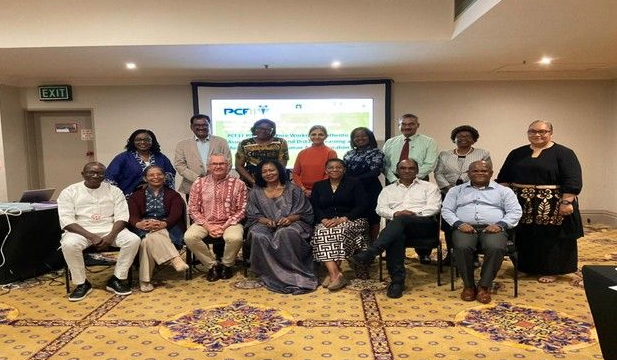
By Professor Jane-Frances Agbu
Adviser: Higher Education
As part of the lead-up to the Eleventh Pan-Commonwealth Forum on Open Learning (PCF11), the Commonwealth of Learning (COL) hosted a pre-conference seminar titled “Authentic Assessment in ODL and Human–AI Collaboration” on 9 September 2025 in Gaborone, Botswana. The seminar gathered experts, academics, and practitioners across the Commonwealth to explore the future of assessment in the era of Artificial Intelligence (AI).
Professor Jane-Frances Agbu, COL Adviser: Higher Education, reaffirmed that authentic assessment lies at the heart of COL’s mission of learning for sustainable development and directly supports the Gaborone Statement, particularly Collective Action 3, which calls for the ethical leverage of the digital dividend, and Collective Action 5, which urges the reimagining of assessment practices.
Authentic assessment has been recognised as an innovative approach for enhancing the quality of ODL assessment practices. As a process, authentic assessment goes beyond testing knowledge—it requires learners to demonstrate deep understanding, higher-order thinking, and problem-solving skills by performing tasks that reflect real-world challenges.
During the panel discussions, participants emphasised that authentic assessment practices must be context-sensitive, inclusive, and adaptable, reflecting learners’ environments, cultural contexts, and lived experiences. Key insights for creating meaningful and empowering assessment practices included:
- The importance of bridging theory and practice, as well as embedding emerging skills.
- Emphasising cultural sensitivity and the integration of Indigenous knowledge.
- Ensuring accessibility for underserved groups, including persons with disabilities.
- Technology, particularly AI and assistive tools, were highlighted as offering new opportunities for enhancing fairness, flexibility, and scalability.
- Authentic Assessment is not a one-size-fits-all model approach, but must remain discipline specific, learner-centred, and equity-driven to be credible and impactful.
In the discussion, three provocations provided additional depth. Dr Prevanand Labby Ramrathan, Professor at the University of Kwazulu-Natal, framed authentic assessment as a dynamic, equitable process that must move beyond grading to track learner growth, align with real-world outcomes, and foster adaptability. While Professor Michael van Wyk from the University of South Africa, called for a shift from traditional examinations toward applied tasks that promote creativity, problem-solving, and student agency, at the same time supporting equity, inclusion, and continuous feedback. Professor Paul Prinsloo also from the University of South Africa explored human–AI collaboration, stressing that while AI can enrich learning and assessment, its integration must be responsible, preserving human creativity, memory, and critical thinking.
Looking ahead, participants identified clear next steps in advancing authentic assessment in ODL:
- Developing AI-informed guidelines.
- Strengthening inclusive institutional policies.
- Building faculty capacity.
- Piloting AI-driven authentic assessments.
- Establishing monitoring and evaluation frameworks.
These actions will help ensure that ODL remains equitable, innovative, and adaptable in a rapidly changing world. By embracing inclusivity, innovation, and responsible human–AI collaboration, ODL can empower learners to thrive and contribute meaningfully to their communities and the wider Commonwealth.
Follow Professor Jane-Frances Agbu on LinkedIn to keep up to date with COL’s work in open and distant education across the Commonwealth.


